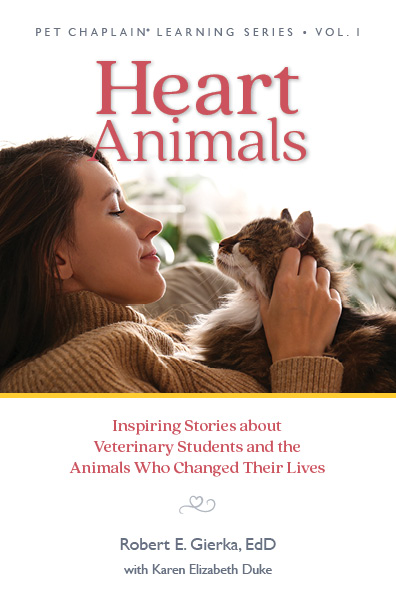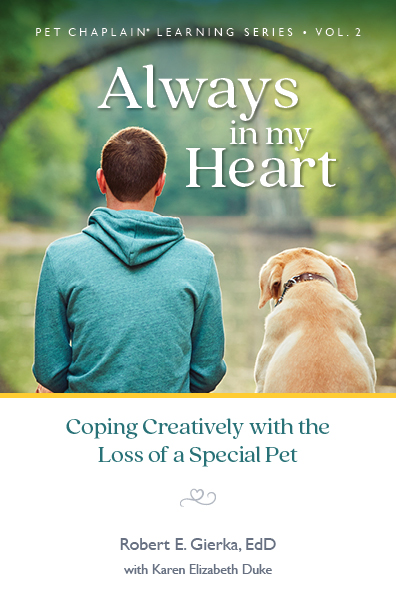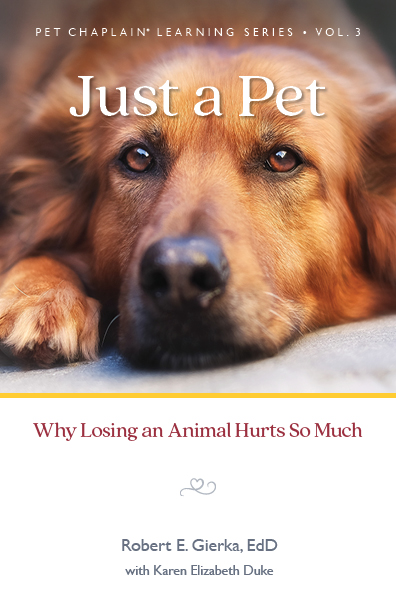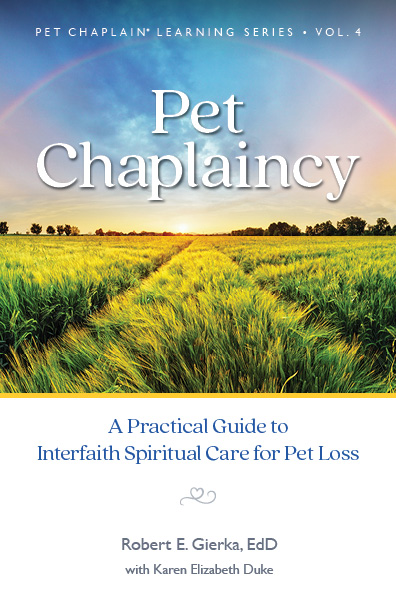THE PET CHAPLAIN LEARNING SERIES

About the Books
The Pet Chaplain Learning Series is a flexible, self-guided educational program designed to meet the unique interests and educational goals of different readers. Each book stands alone, yet the books also complement each other. Read one or read them all, depending on the topics you’re interested in. For the best learning experience, we suggest reading them in the order they’re presented on this page.
The Books at a Glance
The first book in the Pet Chaplain Learning Series is Heart Animals: Inspiring Stories About Veterinary Students and the Animals Who Changed Their Lives. This collection of first-person narratives of pet keeping and loss offers intimate portraits of a diverse group of animal lovers and the special pets who sparked their interest in veterinary medicine.
The second book in the series, Always in My Heart: Coping Creatively with the Loss of a Special Pet, provides an uplifting message for anyone who has struggled with grief after losing an animal companion. Drawing on current understandings of the human experience of grief and how human beings make sense of death and loss, Always in My Heart explores how the journey of grief and healing is a life-long act of creativity that can transform our lives for the better.
The third book in the series, Just a Pet: Why Losing an Animal Hurts So Much, delves into the complex social, cultural, and religious forces that have shaped the modern pet keeping experience. It offers a big picture perspective on the sometimes hidden reasons that losing a beloved animal companion can be so painful while providing a more inclusive and just vision of the human-animal bond.
The final book in the series, Pet Chaplaincy: A Practical Guide to Interfaith Spiritual Care for Pet Loss, is geared specifically to readers who are interested in the practice of pet chaplaincy. It provides a foundational education in the art of veterinary pastoral care and serves as a supplemental study guide for the other books in the series.

Book Details

VOLUME 1
Heart Animals
Inspiring Stories About Veterinary Students and the Animals Who Changed Their Lives
In this engaging story collection, you’ll meet a diverse group of aspiring veterinary nurses, or “vet techs,” and the special animals who captured their hearts.
The real-life tales in Heart Animals reveal the central role that special pets play in our lives and the powerful ways they shape our identities. Readers will venture into the hearts and minds of these unsung heroes of the veterinary world and bear witness to the non-judgmental love that inspired their dedication to a demanding career and their desire to help animals and pet keepers.
Unlike most pet loss books that focus on the short-term aspects of the experience, Heart Animals takes the long view, providing a rare glimpse of the journey of grief that takes shape in the months and years after we say goodbye to the animals who are an important part of our daily lives. Together, these stories demonstrate that, in the fullness of time, the loss of a loved one can be a creative, transformative experience.
Heart Animals introduces core themes that are explored in greater detail in subsequent books in the Pet Chaplain Learning Series. In bearing witness to the intimate pet stories shared by these aspiring vet techs, you’ll learn valuable lessons about the power of the human-animal bond, the spiritual connections between people and their animal companions, the critical importance of social support when a pet is lost, and the creative ways people find to cope with the loss of their animals. The book concludes with a writing exercise that will help you craft a tribute to your animal.



VOLUME 2
Always in My Heart
Coping Creatively with the Loss of a Special Pet
Always in My Heart guides readers on a healing journey for the loss of a beloved pet. The book offers an honest account of the challenges we face when navigating a pet’s end of life—from the anxiety and fear that can surface when the pet’s health is declining, through the moral challenges of euthanasia, to the guilt and anger that so often accompany a pet’s death, and, finally, to the life lessons that emerge as we make meaning of a relationship with an animal companion.
Hope—and love—both survive death. The path to healing after the loss of a special animal is a lifelong journey of creativity and self-discovery that calls on each of us to embrace the inevitability of death and overcome our discomfort with strong emotions. In the long run, a cherished animal will always be with you, even when they are physically gone. The pure, non-judgmental love animals offer resides forever in your heart, and when you learn to share that love in this world, you find true healing and peace while also honoring your pet’s memory.



VOLUME 3
Just a Pet
Why Losing an Animal Hurts So Much
If you’ve lost a beloved pet, you’ve probably heard the phrase, “it’s just a dog” (or a cat or a hamster or a fish…) along with the advice to get another pet to feel better. Such sentiments reflect a culture in which grief for the loss of a cherished animal is still widely trivialized and in which many pet keepers are compelled to grieve alone or deny their feelings.
Just a Pet takes readers on a critical, eye-opening exploration of the complex reasons that the loss of an animal companion is so misunderstood in our society and why these losses can be so painful. Drawing on scholarship from sociology, psychology, human-animal studies, philosophy, and religion, the book digs deep into the historical record to show how Western culture has shaped a false narrative about non-human animals that distorts reality and fails to reflect the powerful bonds we share with our animal companions.
You’ll discover the connection between the social alienation that many pet keepers experience when they lose an animal and the age-old conflict between people who regard animals with respect and compassion and those who see them as useful objects. All forms of life on this planet are caught up in this conflict, and readers who’ve lost an animal will gain a deeper appreciation for the connection between our love for our animal companions and our affinity with the natural world.



VOLUME 4
Pet Chaplaincy
A Practical Guide to Interfaith Spiritual Care for Pet Loss
The final book in the Pet Chaplain Learning Series is a call to action for anyone who wants to learn to better support people who are grieving the loss of an animal companion. Pet Chaplaincy provides a foundational education in the principles and practice of interfaith spiritual care for pet loss and serves as a supplemental study guide for the first three books in the series.
Because storytelling is central to the practice of pet chaplaincy, we developed the Pet Chaplain Method of Storytelling, a gentle yet effective approach that encourages pet keepers to reframe their experiences with special pets beyond their loss, and give voice to the deep meaning and lasting value of those relationships.
Interfaith spiritual caregiving requires a deep awareness of your personal beliefs and feelings about the topics that are of greatest concern to the people you serve. The first three books in the Pet Chaplain Learning Series will help you articulate your values and beliefs about many topics that are central to pet keeping and loss, including the human-animal bond, euthanasia, grief, death, animals and spirituality, and the afterlife. Beliefs about animals vary greatly in our society, and the series as a whole will prepare you to respond with empathy to people who feel as you do about animals—and with sympathy and tolerance to those who do not.
Thought-provoking questions and rigorous exercises that will challenge you to put on your “chaplain’s hat” and consider the key concepts explored in the series from a chaplain’s perspective. You’ll be asked to respond to selected pet stories from the series not just as an animal lover, but as a spiritual caregiver—seeking only to understand the worldview of the storyteller.
Highlights
A unique approach to the concept of presence. Pastoral care is often referred to as a “ministry of presence.” We look to our animal friends for inspiration as we learn how to be fully present in the moment and offer our healing presence to those in emotional and spiritual crisis.
A primer in compassion. People often use the terms empathy, sympathy, and compassion interchangeably, but there are key differences between these concepts. Understanding these differences can help you push the edges of your compassion and listen to others without judgment.
An overview of religious and spiritual perspectives about animals. Veterinary chaplains will greatly improve their ability to offer a spiritually-sensitive response to grieving pet keepers with a basic understanding of the perspectives about animals in the world’s major faith traditions as well as ancient spiritual practices and emerging perspectives drawn from scientific understandings of the natural and social worlds. Though Eastern and Western traditions vary greatly in their view of the divine and the natural world, you may be surprised by the commonalities and, in particular, the emphasis on the need for human beings to show compassion for all living things.
Tips for creating memorials and rituals. One of the greatest gifts you can offer to someone in emotional and spiritual crisis is a meaningful prayer or secular reflection as well as memorable rituals that honor a pet’s memory. Pet Chaplaincy offers guidelines for crafting prayers, reflections, and rituals, both extemporaneously or as part of a planned memorial service.
Pastoral communication techniques. Our detailed review of the communication techniques most commonly used in veterinary chaplaincy will help you hone your ability to support grieving pet keepers. These techniques are used to open up a conversation and put the focus on the grieving individual.
Sample pastoral conversations. Known as “verbatims,” transcripts of actual conversations between a chaplain and a pet keeper provide great insight into the give-and-take of a pastoral conversation. A rubric for “leading and following” in a conversation helps readers review these conversations with a critical eye and consider how a different response on the part of the caregiver might have resulted in a more helpful outcome.
Case studies. First-person narratives of pet keeping and loss provide a great opportunity to practice and apply all that you’ve learned. Simple exercises will help you develop the ability to listen to these stories with your heart rather than your mind.
Guidelines for responding to children, seniors, and other special groups. You’ll learn best practices for responding to the unique needs of children, seniors, and other special groups, such as people who rely on service animals for physical and emotional support.
Tips for facilitating a pet loss support group and launching a pet ministry. Opportunities for informal community service as a veterinary chaplain, such as pet loss support groups and pet ministries in places of worship, are abundant. People grieve for animals in many settings, from shelters for the homeless and victims of domestic violence to senior care facilities where residents may have been forced to relinquish a pet they could no longer care for.
An eye-opening look at the crisis in the animal care world. Rates of compassion fatigue, burnout, substance abuse, and suicide are above average among veterinary professionals as well as people who work in animal rescue and control. We believe that this is a crisis of the human spirit as animal caregivers regularly suffer moral distress in their work. Many are asked—or compelled—to do things to animals that conflict with their love of animals and their desire to save animal lives. Pet Chaplaincy takes readers into the back room of the veterinary world to raise awareness about this spiritual crisis and consider how average pet keepers as well as spiritual caregivers can help.

